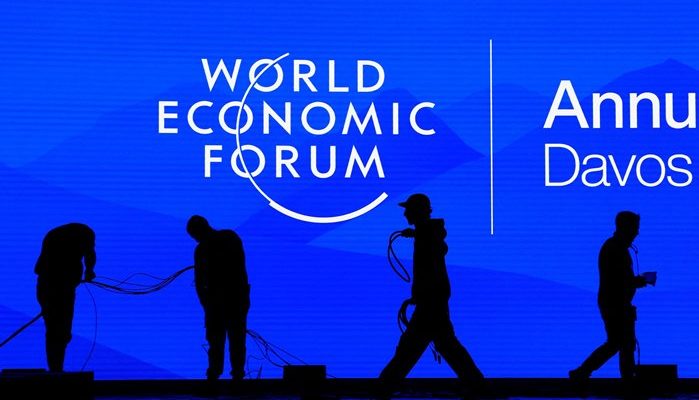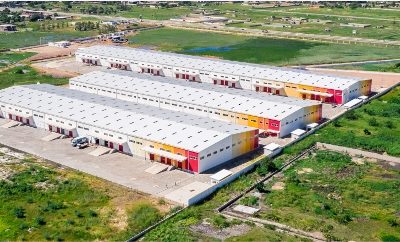The World Economic Forum announces signing agreements for three new Centres for the Fourth Industrial Revolution (C4IR) launching in 2025, reinforcing its global leadership in leveraging technology for transformative change.
RELATED: Pope, world leaders call for action on AI and regional reforms at World Economic Forum
The upcoming centres in Muscat, Pretoria, and Riyadh will tackle critical global challenges with innovative solutions tailored to national and regional needs. Additionally, C4IR United Arab Emirates has been renewed.
These announcements are complemented by the release of Forum’s C4IR Network 2023-2024 Impact Report, which highlights how the expanding global network is advancing technological solutions to humanity’s most pressing challenges.
“The upcoming launches of three new C4IR Centres underscores our commitment to shaping a future where technology better serves humanity,” said Børge Brende, President and CEO, World Economic Forum.
“Together, with our growing network of global partners, we will continue to harness the power of innovation to address society’s most pressing challenges and create localized solutions with global reach.”
C4IR Oman
Hosted by the Ministry of Transport, Communications and Information Technology of Oman, C4IR Oman will be aligned with the country’s “Vision 2040” and spearhead its technological and digital transformation. Once launched, the Centre – the first in the country – will focus on AI competitiveness, governance, the energy transition and quantum.
By harnessing cutting-edge technologies, the Centre will catalyse national development, drive sustainable economic growth and solidify Oman’s position as a leader in innovation in the Intelligent Age. Through this collaboration, C4IR Oman will contribute to the Forum’s AI Governance Alliance, with a particular focus on how AI can advance the energy transition.
“Oman is partnering with the World Economic Forum to leverage the Fourth Industrial Revolution for a sustainable future,” said Said Mohammed Ahmed Al-Saqri, Minister of Economy of Oman.
South Africa Centre for Industry and Technology
Hosted by the University of Pretoria and run in collaboration with South African academic institutions, the South Africa Centre for Industry and Technology will advance the nation’s readiness for the future of global value chains and the energy transition, with a focus on the twin challenges of inclusive cross-industry digitization and decarbonization.
To accelerate innovation and partnerships in pursuit of this mission, the Centre will partner with government and business, and leverage the Forum’s global communities and initiatives, notably those led by the Forum’s Centres for Advanced Manufacturing and Supply Chains and Energy and Materials and the Fourth Industrial Revolution.
“The launch of the Centre for Industry and Technology, in partnership with the World Economic Forum, is a major step in driving technological progress and industrial transformation,” said Francis Petersen, Vice-Chancellor and Principal of the University of Pretoria, South Africa.
Riyadh Centre for Cyber Economics
Hosted by the Global Cybersecurity Forum in Riyadh, the Centre for Cyber Economics (CCE) will focus on the economic aspects of cybersecurity. It will drive research, foster cross-sector collaboration and develop evidence-based frameworks to enhance global cybersecurity resilience and economic stability. Another key area of focus will be reducing cyber disparities across geographies and industries.
“Cybersecurity is a catalyst for economic growth and social prosperity, playing an imperative role in shaping resilient economies,” said Majed bin Mohammed Al-Mazyed, Governor of the National Cybersecurity Authority of Saudi Arabia, acting on behalf of the Board of Trustees of the Global Cybersecurity Forum.
“The Centre for Cyber Economics marks a decisive step towards advancing knowledge and understanding of the economic dimension of cybersecurity to safeguard economic growth, unlock new opportunities and reveal new pathways for cross-sector collaboration towards a resilient future for global economies.”
2023-2024 C4IR Impact Report Highlights
The announcement of signing agreements for the three upcoming Centres is complemented by the release of the C4IR 2023-2024 Impact Report, which highlights the transformative global impact of the C4IR Network. Over the past year, the Network launched over 70 initiatives, engaged more than 300 partners and collaborators, and saw more than 14,000 people participate in over 70 in-person or virtual events.
Network’s achievements
The report breaks down the Network’s achievements across seven core thematic areas:
- “Ushering in the Intelligent Age” through advancements in AI and automation
- “Transforming agriculture and food systems” to address global food security
- “Revolutionizing health and biotechnology” by expanding access to health innovation and education
- “Accelerating energy transition and sustainability” to support global climate goals
- “Innovating mobility with autonomous systems” to improve efficiency in the movement of people and goods
- “Upskilling tomorrow’s workforce” to ensure society progresses alongside technological advances
- “Fostering investments in competitiveness and emerging technologies” by exploring areas like digital assets, quantum computing and space innovation
The thematic areas highlight 12 case studies from eight countries: Azerbaijan, India, Israel, Malaysia, Rwanda, Saudi Arabia, Serbia and the United States.
These efforts demonstrate the Forum’s commitment to harnessing technology to address pressing challenges and foster sustainable, inclusive global growth. As the Forum expands its global reach through the establishment of new centres throughout 2025, these themes will remain critical, with new centres tailoring their efforts to meet the unique needs and strengths of their host nations.
About the Centre for the Fourth Industrial Revolution Network
The Centre for the Fourth Industrial Revolution is a platform for multistakeholder collaboration, bringing together public and private sectors to maximize technological benefits to society while minimizing the risks. It explores exponential technologies and drives their responsible adoption and application, leveraging a global network of independent national and thematic centres.
The World Economic Forum launched the first Centre for the Fourth Industrial Revolution in San Francisco in 2017, followed shortly by Centres in Japan and India.
The Network now includes Centres in Azerbaijan, Colombia, Germany (Berlin Global Government Technology Centre), Korea (Gyeonggi), India (Mumbai and Telangana), Israel, Kazakhstan, Malaysia, Oman, Qatar, Rwanda, Saudi Arabia (Centre for the Fourth Industrial Revolution, Centre for Space Futures, and the Riyadh Centre for Cyber Economics), Serbia, South Africa, the United Arab Emirates, the United States (Centre for Trustworthy Technology and US Centre for Advanced Manufacturing in Michigan), Ukraine (Kyiv Global Government Technology Centre) and Viet Nam.































